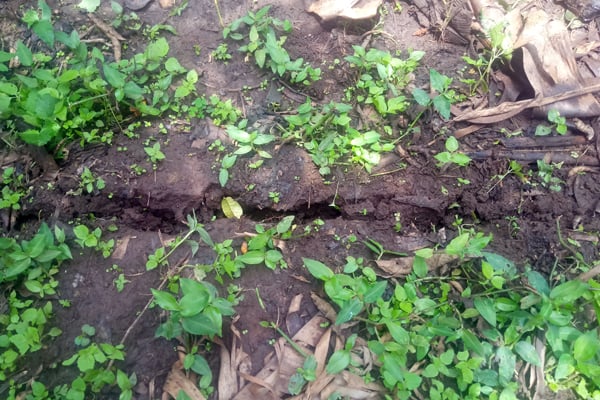Prime
Fear of landslides as fresh cracks emerge in Sironko

One of the cracks is 3kms long, running through several villages of Washango, Bumagaba, Simi, Salo, Bukilindya and Zamugogoni, among others, in Bukiise and other neighbouring sub-counties.
What you need to know:
- One of the cracks is 3kms long, running through several villages of Washango, Bumagaba, Simi, Salo, Bukilindya and Zamugogoni, among others, in Bukiise and other neighbouring sub-counties.
Locals and leaders in Sironko District have expressed fear of a looming disaster after fresh cracks were cited in several sub-counties, which are prone to landslides.
Among fresh cracks include a three-kilometer crack running through several villages of Washango, Bumagaba, Simi, Salo, Bukilindya, and Zamugogoni, among others in Bukiise and other neighbouring sub-counties.
Last week, a landslide occurred in the villages of Bukirindya, Busiu Nalugugu, and Kilulu in Bukirindya Parish, Bukise Sub-county, leaving a number of animals dead and crops destroyed.
The landslide also buried two homes and displaced about 600 residents, who are now living with relatives. Fortunately, no human life was lost.
Mr Sam Welikhe, the Salo Village chairperson, said with the ongoing downpour, their lives are under danger.
“With these cracks, landslides are likely to occur again. We cannot leave because certainly, we have nowhere to go,” Mr Welikhe told Daily Monitor on Monday.
Mr Welikhe said most of their houses have also developed cracks, and that they are susceptible to flooding whenever it rains.
“The water emerges from underground in our houses when it rains heavily. We are living in deplorable conditions,” he said.
Mr Simon Gibune, another affected resident, urged the government to relocate them to a safer place.
“We are ready to vacate and buy land from other safe places if the government is ready to support us financially,” he said.
Mr Yofesi Malanga, the area district councillor, said as district leaders, they are disappointed with the government on the issue of resettlement.
“The government gambles with people’s lives. They are never serious and the issue of relocating people to Bunambutye [Resettlement Camp in Bulambuli District] seems to have lost track,” Mr Malanga, said.
Mr Malanga said the district wrote to the concerned ministry over the looming disaster but they have not received any positive response.
“The government should respond by supporting affected people with relief items such as food and iron sheets,” he said.
Mr Isaiah Sasaga Wanzira, the Budadiri East MP, also blamed the government for delaying to evacuate people living in landslide-prone areas.
“As people are living in fear of landslides, their houses have developed cracks due to the current downpour, but the government is silent on the matter,” he said.
The MP made the remarks while delivering relief items to the affected families on Monday. The items included two tonnes of maize flour and 50 boxes of soap, among others.
While addressing landslide victims and leaders at Bunambutye Resettlement Camp in Bulambuli District in August, Prime Minister Robinah Nabbanja said her office was facing financial constraints due to budget cuts owing to the outbreak of the Covid-19 pandemic.
Ms Nabbanja, however, said the government was committed to relocating people from landslide prone areas.
The government in 2013 bought more than 2,800 acres of land at Bunambutye to relocate and resettle people from different landslide prone-districts in Bugisu Sub-region.
Close to 241 families, comprising more than 4,000 people, have so far been resettled in the camp in two phases between 2019 and 2020.
The first batch was resettled in May 2019, and another in February 2020.
Mr Jastus Masaba, a forester, said the viable way to end landslides in Bugisu Sub-region is to improve soil strength by planting different indigenous trees.
“The landslides keep occurring in Bugisu Sub-region due to lack of enough trees, soil saturation and also the slope factor,” Mr Masaba, said.
He said tree diversity in the landslide-prone areas of Sironko in the sub-counties of Butandiga, Bukiise, Masaba, and Zesui are low.
“These areas have low tree species cover, which makes them vulnerable to disasters,” he said.
Mr Masaba said there is also need to undertake a comprehensive study by soil, biodiversity, hygrologist and forestry scientists to establish ways to mitigate landslides in the region.
Dr John Okuonzi, an ICT director at Kyambogo University, and a trainer of Al Chatbot, a tool used in disaster response, blamed the rampant disasters on climate change.
“Due to climate change, we will continue to experience landslides, floods and other disasters. The only way is to find solutions to mitigate the effects,” Dr Okuonzi said.
The Al chatbots is designed to simulate human-like conversations to share and manage disaster information.
The tool was developed way back in Japan in 2011, and adopted and embraced in different countries to build and strengthen the capacity of communities to respond and report disasters.
It is being piloted in Uganda by the United Nations Educational, Scientific and Cultural Organization (Unesco) to strengthen disaster prevention approaches in Eastern Africa.
While addressing district officials in Mbale City last week, Ms Rosie Agoi, the secretary general of Uganda National Commission for Unesco, said the new development will empower communities to prevent disasters.
Background
Previous incidents
In June 2019, a landslide occurred in Buwali Sub-county, leaving five people dead and more than 400 displaced in Bududa.
In October 2018, 42 people were reportedly killed and more than 500 people displaced in Suume Village in Bukalasi Sub-county in Bududa.
In August 2017, a landslide hit Bufupa parish in Masaba Sub-county in Sironko District, killing seven people and displacing hundreds.
In June 2012, another landslide occurred in Namaga and Bunakasala villages in Bumwalukani Sub-county in Bududa, leaving about 450 people reportedly dead and property, including houses, destroyed and livestock killed.




